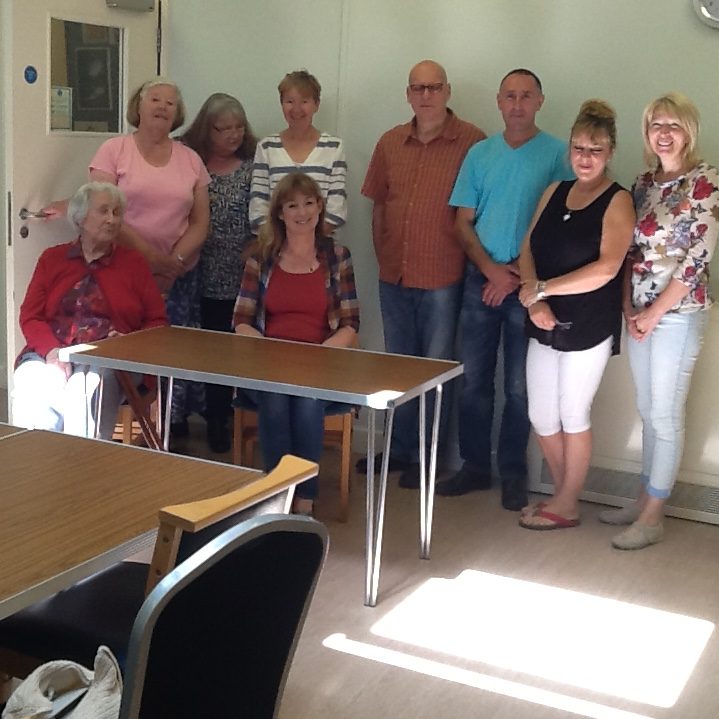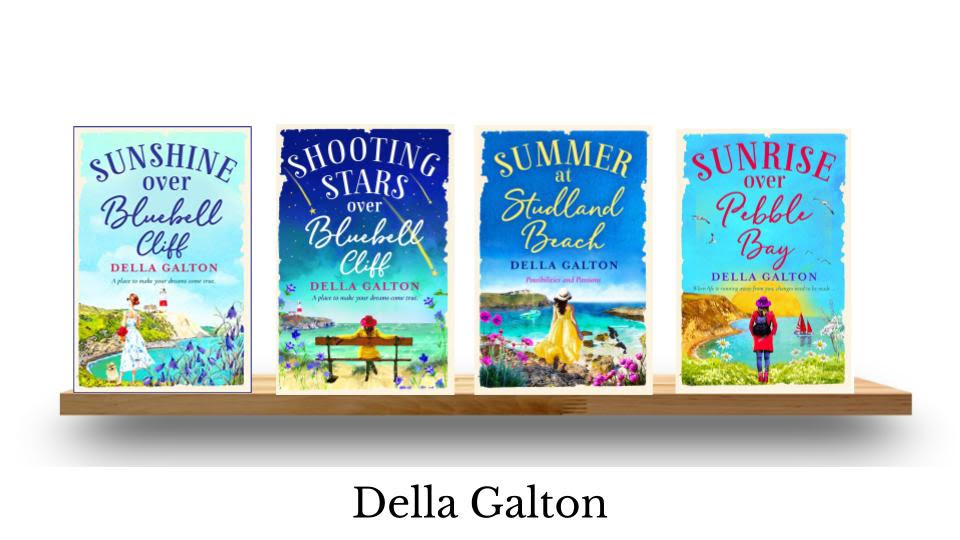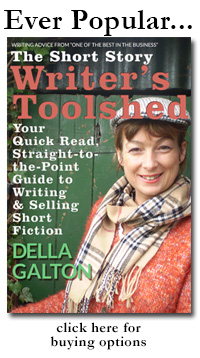Recently, a lady wrote in to my Dear Della column in Writers’ Forum and asked me about turning a poem she had written into a story. She wanted to know how to go about it. This is something I’ve done several times. I don’t generally use my own poems. I’m more inspired by other people’s. So this blog is about how one of the lovely James Nash’s poems became a Della Galton story. Both are published. The Promise in James’ book, and my story in Woman’s Weekly. But James has kindly agreed to let me reproduce his wonderful poem, The Promise, here.
The Promise by James Nash
We sit outside in the garden, you flat out on my knee, arms flailing at the Pyrex moon.
Honeysuckle hangs in the crab apple tree and feeds the night air as you fix me with a wondering amiable eye, gummy with sleep and half dried tears.
Inside the house she sleeps, lights blazing and every window flung open in a fragment of coma.
Breath heavy and exhausted, one breast leaks through cotton while her still rounded belly is pregnant only with hope.
A hope I share.
For your coming both completes me and shows me my lack of completion. I have never known my parents and look again and again into the faces of strangers for something of myself.
I can trace our contributions in your face, your form and your moonstone fingernails.
Though seasons and times may not always be sweet for you, I hope that you will know, as I did not this whispered long term guarantee of love.
Isn’t it wonderful!
I then asked James if I could base a story on his poem and being the lovely man he is, he agreed. Beneath the story I explain how I used the elements of the poem to create the story. Just in case anyone else would like to try this.
Here’s the story:
Evidence by Della Galton
The drive back from the hospital was both an ending and a beginning. Richard’s hands gripped the steering wheel, not with fear any more, nor with any of the nightmare tension of the preceding weeks, but with a care born of his new responsibilities.
On the back seat Jess sat close to their precious cargo. Richard was torn between keeping his eyes on the road and looking in the rear view mirror. He could see the curve of Jess’s cheek, the glow of happiness on her exhausted skin, the smile that never left her lips. It was the day they had thought would never come: the day they took their baby son home.
For the last few weeks the fragile pendulum of his son’s life had swung between hope and despair. Other emotions had been there too: the helplessness of being reliant on hospital staff, on machines, on God; the anger that this should be happening to them. Why them?
More than once he and Jess had stood by the incubator, having been summoned to say goodbye, and had held each other very tightly and wept. They had named their son, Douglas – after Jess’s father, a stocky, flame haired Scotsman. They had named him without knowing if he would survive. But Douglas, showing a fair bit of the hot headed stubbornness of his namesake had rallied. Each time the doctors thought he would not he had decided to live another night, his tiny heart beating strong, refusing to give up, proving everyone wrong.
On that first day back home they sat in the garden. It was late June. They sat on loungers beneath the shade of an ancient horse chestnut. Upstairs the yellow nursery with its frieze of smiley suns waited. The white cot with its softness of covers, the tiniest of specially made prem-baby clothes, the bottle in its steriliser – all of these things waited. And Richard swallowed the hugest of lumps in his throat and thought that all their baby really needed was a blanket, Jess’s breasts and a whole shedload of love.
And also on that first day and on every day since Richard had searched his son’s face for something he recognised of himself.
The Scottish lineage was evident. His son already had the hot red hair of the last three generations and his mother’s fierce little mouth. But Richard could see nothing of his genes. Deep inside him an ache was growing. An ache he hardly dared acknowledge or bring out into the light.
All through those long nights at the hospital he had prayed only for Douglas to live. He had watched the rise and fall of his chest, he had listened to the machines, he had held tight to Jess’s damp clenched fingers, and he had never dared ask for more than for his son to live. Now he felt ungrateful. He felt as though he should be thanking someone – God, the universe, destiny – for the miracle of his son’s life. He should not be looking for evidence of his own genes.
And besides, perhaps it was a good thing Douglas took after his mother – why would he want the tall gangly limbs of his father, the thinning hair, the anxious grey eyes? Why would he want any of these things?
‘He has his grandfather’s lungs,’ Jess said one Saturday afternoon when they were in the lounge and Douglas was yelling at the top of his voice.
‘Let me take him.’ Richard held out his arms. ‘Why don’t you go to bed for a while, love. Get your head down.’
‘I doubt I’d sleep.’ She laughed as she held their son up in front of her while he screwed up his face and bawled. ‘We haven’t got soundproof doors.’
‘I’ll take him out,’ Richard said. ‘We’ll walk to the park. It’s a lovely day.’
She yawned. ‘Go on then. And thanks.’
It was in the park that it happened. And it probably wouldn’t have happened but for the old lady with the pink and yellow walking stick. He admired it as he walked past and she smiled at him and said. ‘Do you like it? I got it because it reminded me of the sticks of rock I had as a child. Sugar candy colours.’ She leaned into the pram. ‘What a fine looking young man.’
He stopped – of course he stopped – he was radiating pride.
‘You can’t always tell,’ she said, ‘when they’re that little, but he’s an unmistakeable boy. Look at that strong little jaw.’ She glanced up at him. ‘Just like yours. And he has your long fingers too, doesn’t he, bless him. Does he have long toes?’
‘Yes,’ Richard said, feeling a glorious sense of recognition sweep through him. ‘Yes, yes, he does.’
‘You must be so proud.’ She cooed into the buggy. ‘You’re going to be even taller than your daddy, aren’t you, my darling? Is Mummy tall too?’
‘No,’ Richard said. He didn’t even mind her over-familiar use of “my darling”. He wanted to hug her. He wanted to punch his fist up to the heavens. He wanted to jump up and down. How come it had taken a stranger to point out what should have been so obvious?
Not evidence that Douglas was his – he knew that without a shadow of a doubt – the love he and Jess shared was the most solid thing in his life. But evidence of himself, his own genes – maybe he hadn’t spotted it because he just hadn’t known where to look.
He had never known his own parents. He’d grown up in the care system. His birth parents had registered a wish that he never get in touch. But that hadn’t stopped him searching. When he was out with his foster carers in supermarkets, on buses, on day trips to the seaside, he had scanned the faces of passers by. He had searched for something he recognised, something of his own, some sense of history, of roots, of belonging.
Richard reached into the pram and Douglas gripped tight to his finger. ‘My son,’ he whispered, oblivious now to the old woman and her sugar candy walking stick, oblivious to the fact he was in a public place and there were tears rolling down his face.
‘My son,’ he said again, feeling – for the first time in his life – utterly complete.
How I went about it
- I decided to write the story in male viewpoint – as it’s primarily about a man. Richard, my main character, was born.
- Interestingly, in the poem, the character’s ‘problem’ is that he’s adopted and he didn’t have the stability of genetic parents. The denouement is that he promises his son that he WILL have a long term guarantee of love.
- To make my story work I felt I needed a further problem. I made Richard’s son, Douglas, a fragile baby who’s only just come out of hospital when the story begins. Also there are hints that Richard can’t see himself in his son’s face. I want the reader to think that Richard is worried about his son’s parentage. So I misdirect them.
- I also decided to withhold the adoption strand from the reader in order to create a mini twist. We do not find out until near the end that Richard is adopted and this is why he searches his son’s face for something of his lineage.
- This conclusion also needed the introduction of a new character, so we have the addition of the old lady with the pink and yellow walking stick in the park.
Thank you very very much to James Nash. You can check out James and his work here
Also you can visit his Amazon page here. The Promise is published in the book Coma Songs.





I have used friends poems as inspiration for stories a couple of times. As you say it’s mainly the emotions which are carried over.
I love the idea of this, Della. The emotion is so evident in both the poem and the story. Both are superb – thank you for sharing! Your explanation of how you went about it was really helpful too. 🙂
Thanks Patsy and Jan for commenting. I think that’s why I love it so much – the poetry is distilled emotion and the story can then come from that 🙂
Really enjoyed both the poem and the story, Della.
I have enjoyed doing this once or twice – the story can (sometimes) turn into something more than at first I imagined it would!
Thanks Penny. And yes it’s great when that happens isn’t it.
Ahh, pass me the After-Eights 😉
Have you ever converted a story into a poem? I’m thinking of doing that with one of mine.
Actually, no, Captain Black, I haven’t! But do let me know how you get on. And glad to hear you’re enjoying the after eight mint rule 🙂
I loved the poem and the story it inspired!
Creativity is a never ending cycle!